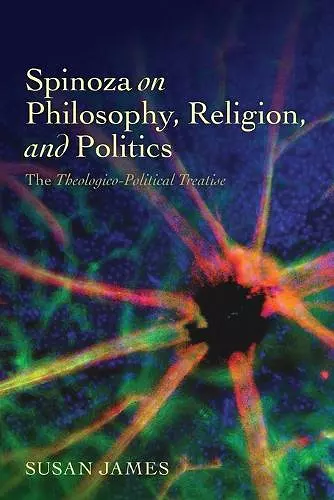Spinoza on Philosophy, Religion, and Politics
The Theologico-Political Treatise
Format:Paperback
Publisher:Oxford University Press
Published:9th Jan '14
Currently unavailable, and unfortunately no date known when it will be back
This paperback is available in another edition too:
- Hardback£90.00was £90.00(9780199698127)

Spinoza's Theologico-Political Treatise is simultaneously a work of philosophy and a piece of practical politics. It defends religious pluralism, a republican form of political organisation, and the freedom to philosophise, with a determination that is extremely rare in seventeenth-century thought. But it is also a fierce and polemical intervention in a series of Dutch disputes over issues about which Spinoza and his opponents cared very deeply. Susan James makes the arguments of the Treatise accessible, and their motivations plain, by setting them in their historical and philosophical context. She identifies the interlocking theological, hermeneutic, historical, philosophical, and political positions to which Spinoza was responding, shows who he aimed to discredit, and reveals what he intended to achieve. The immediate goal of the Treatise is, she establishes, a local one. Spinoza is trying to persuade his fellow citizens that it is vital to uphold and foster conditions in which they can cultivate their capacity to live rationally, free from the political manifestations and corrosive psychological effects of superstitious fear. At the same time, however, his radical argument is designed for a broader audience. Appealing to the universal philosophical principles that he develops in greater detail in his Ethics, and drawing on the resources of imagination to make them forceful and compelling, Spinoza speaks to the inhabitants of all societies, including our own. Only in certain political circumstances is it possible to philosophise, and learn to live wisely and well.
Susan James's book on Spinozaâs Theological-Political Treatise is a magnificent work of historical and contextually focused philosophical scholarship. Anyone interested in Spinoza, the Dutch Republic, or early modern philosophy would profit by reading it. James richly situates Spinozaâs Treatise in its proper context and thereby illuminates Spinozaâs thought in a profound way. The Spinoza that emerges here is not the abstract metaphysician of the Ethics, but a savvy political thinker addressing the particulars of his time and place. In all, this book should fundamentally alter the way we think of this great text and, more broadly, the issues it addresses. * Journal of the History of Philosophy *
Though countless scholars have written about the Theologico-Political Treatise, none have covered it so clearly and comprehensively. This is a valuable book on an important text. It is that rare thing: an impressive work of research and philosophical thinking which can also function as a guide for students and a resource for scholars. It should be the first book consulted by anyone who seeks to understand what Spinoza is arguing for, and why he argues for it, in his most puzzling text. * Beth Lord, The Philosophical Quarterly *
a magnificent work of historical and contextually focused philosophical scholarship. * Eugene Marshall, Journal of the History of Philosophy *
- Winner of Winner of the Journal of the History of Philosophy Book Prize.
ISBN: 9780198701217
Dimensions: 235mm x 156mm x 20mm
Weight: 510g
360 pages